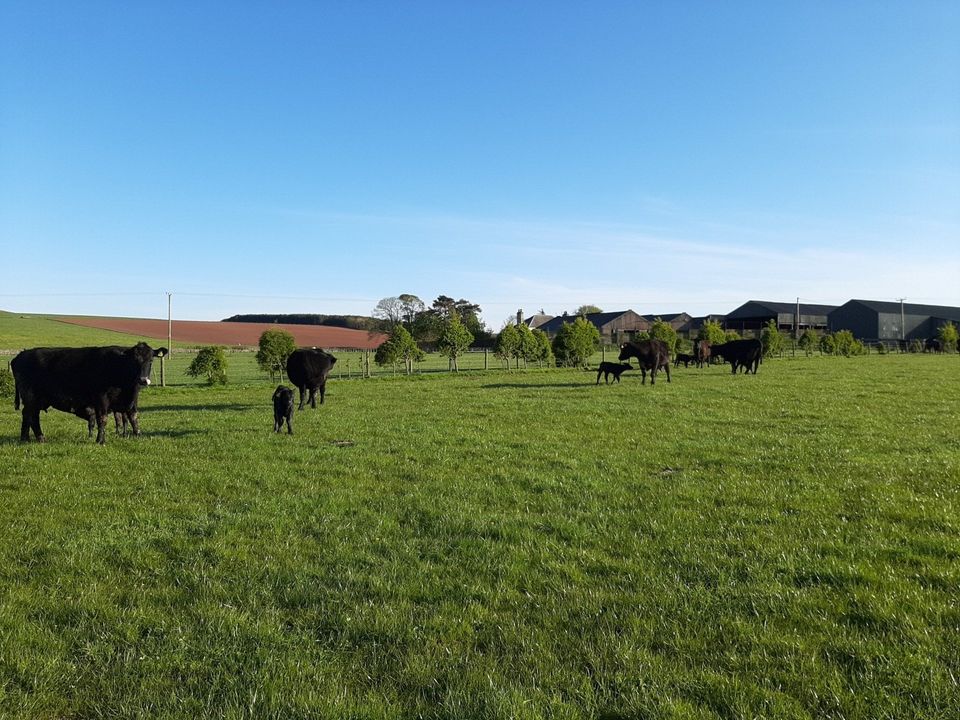Hardiesmill Ethical Scotch Beef in 'Lock Down'
Hardiesmill Beef started in 2001, and were grass-finishing cattle in 2003, way before Grass-Fed cattle was as fashionable as it is today. Why did we decide to grass-feed our cattle then, quite simply we thought the beef tasted better. We turned away from the market-place and decided to sell direct.
By early 2003, we finished cattle and were having them killed and butchered to sell in boxes over the UK. It was hard work! We spent our days learning about the different cuts, as north and south of the border and that even regions have different ways to cut a carcass and names for parts of the carcass. We started to collate a glossary of cuts which is on our website. We learnt a great deal.
Hardiesmill expanded and we took on a full-time butcher. Lee, who taught us new muscles and we learnt from customers others! The frying pan in hand we tasted a great deal. We continued to sell our beef direct to both restaurants and direct to customers. We went to trade shows, shows and tried to share our passion! By the mid-2010s, we were concentrating on the wholesale side of the business supplying 12 restaurants and Kelso Farmers Market, with two full-time butchers Brian and Stewart.
Regular farms finish their cattle in batches/fields and send them to either the local Mart or Direct to Slaughterhouses. These farmers are paid £/kg on the carcass grade a classification of fat covering and shape, built around the European (continental cattle) at the beginning of the 1970s. Butchers shops buy primals or full-carcasses direct from farms, or through wholesalers. These animals are fed to go through the system as fast as possible to a maximum weight of 700kg liveweight, to meet the market required by the butcher. If a butcher buys primal cuts, these have been hung in the abattoir for the minimum time of two weeks. The carcasses are hung for the minimum time, cut and sold. If carcasses are hung for longer, it will be certain cuts not the whole carcass. Currently, there is no reward for eating experience of the beef that is produced.
At Hardiesmill, we finish two animals every two weeks, at present, because of Covid-19. Only Hardiesmill animals are slaughtered for our own butchery and no finishing cattle sold to other butchers or marts. In other words, the cattle come from the species rich grasslands at Hardiesmill. Giving the beef a unique taste of the ‘terriore’/minerality from the farm. No grain or concentrate is fed in the animal’s life. In the winter, the animals are in outside corals being fed grass-sileage or hay from our own farm. They are bedded on straw. They are turned out when the new growth appears! This year this is slightly later due to the lack of rain (40% behind the long term average (QMS)). Not that we are complaining, we are grateful for what we are given! The forequarters are hung for two-weeks, broken down into cuts and hung by cut. The Hindquarters are hung for minimum of four weeks, again broken into muscles and hung further according to cut. The fillets are hung for weeks on the bone, giving it a unique taste. We specialise in producing some 18 different steaks (cooked as a regular steak, on or in the grill), depending on whether you like taste over tenderness or tenderness over taste, each is like a wine, the way the muscle works gives a different taste and texture.
The Covid-19 situation meant that on 21 March, our business had died with the closure of the restaurants, yet we had carcasses hanging in the chillers! Even Kelso Farmers Market was cancelled, yet we had food able to be sold.
We dusted ourselves off and started selling direct to customers again. Appreciating that customers have to drive to find us, learning that courier companies changed their timetables, so everything is ready for 10 am in the morning, and that we have to visit the Post Office lots for those parcels which are heading to surcharge areas of the UK, (anything north of Edinburgh). We have built an on-line shop, learnt to answer the phone as they are not all sales calls for cheap electricity, and that any car passing could be a customer! We have found a good-sized box, for selling retail that is environmentally friendly, we have re-ordered our wonderful @Woolcool’ envelopes. We strive to keep our carbon footprint as low as possible.
The cattle are calving and slowly going out to the fresh pasture as the grass grows! We are learning about marketing our beef direct to our customers, facebook posts, photos, etc. Hoping that we can survive the storm and keep doing what we are passionate about = good beef produced in the most ethical way – ie using pure-bred grass-converters to produce best beef! Time will tell if we can, but we do love what we do!
To all our customers new and old, we say thank you for the support. Keep safe and Enjoy Hardiesmill Ethical Scotch Beef. If you have questions about the various cuts please don’t hesitate to ask or even how to cook something.



